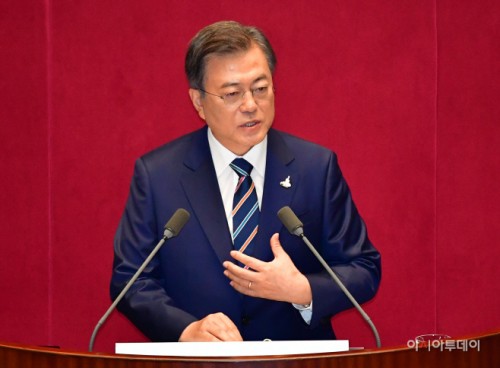 |
| President Moon Jae-in delivers a speech at the opening ceremony of South Korea’s 21st National Assembly in Seoul on July 16, 2020./ Photographed by Lee Byung-hwa |
AsiaToday reporter Lee Jang-won
President Moon Jae-in has decided not to lift the development ban on greenbelt zones around Seoul on Monday, putting an end to weeks of controversy on whether to lift the restrictions to build homes in order to tackle skyrocketing home prices.
According to the Prime Minister’s Secretariat, Moon reached the decision during a weekly meeting with Prime Minister Chung Sye-kyun. “The President decided not to open up the greenbelts but to preserve them for future generations,” the secretariat said in a press release.
Earlier, the opposition bloc pointed that the president should make his position clear, saying that the government and the ruling bloc have delivered mixed messages over the real estate issue. Last week, presidential chief of staff for policy Kim Sang-jo said in a radio interview, “The government and the ruling Democratic Party have already reached an agreement,” indicating they had agreed on lifting the greenbelt development ban. Two days later, Prime Minister Chung Sye-kyun told a local TV station that the nation needs to take a very cautious approach about opening greenbelts, seemingly contradicting Kim’s comments. Then senior DP lawmaker Jin Sung-joon admitted that housing prices won’t be curbed despite such efforts by the government, aggravating confusion in the real estate market.
Kim Chong-in, the emergency committee chief of the main opposition United Future Party, said Monday, “It is unclear who is leading the real estate policy. To avoid confusion, the president should make a decision.” Sim Sang-jung, leader of the minor progressive Justice Party, also called for the president’s decision, saying, “President Moon Jae-in should reveal his position. We urge the president to prepare measures that the public can trust.”
At the same time, the ruling party voiced concern that the discussion on lifting greenbelt restrictions was too hasty. “You must be extremely cautious in dealing with the greenbelt issue,” said Lee Nak-yeon, a frontrunner for the DP presidential nomination in 2022, on Monday. “It is neither wise nor responsible to discuss the greenbelt issue at this stage,” he said. Gyeonggi Province Governor Lee Jae-myung said, “Expanding housing supply by damaging the greenbelt zones needs to be reconsidered. Supplying housing by opening Seoul’s greenbelt would bring more losses than gains.”
According to the prime minister’s office, the president and the prime minister agreed instead to find lands allocated for public facilities to turn them into residential districts, including a golf course near Taereung in northeastern Seoul. In response, the Ministry of National Defense said it would discuss about the necessity of expanding housing supply and the impact on military welfare with the relevant ministries and local governments.
Meanwhile, the ruling party has proposed moving remaining government offices and parliament to the administrative capital of Sejong to counter soaring housing prices. Kim Tae-nyeon, floor leader of the ruling DP, said in his address to parliament on Monday that relocating the National Assembly, presidential office and government ministries to Sejong would be one way to tackle the overheated property market and called for action from the Assembly.
#Moon Jae-in #greenbelt zones #real estate #housing prices #Chung Sye-kyun
Copyright by Asiatoday
Most Read
-
1
-
2
-
3
-
4
-
5
-
6
-
7





















